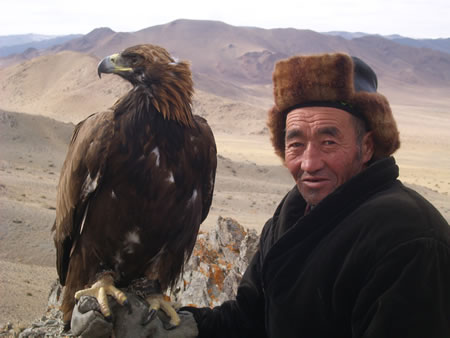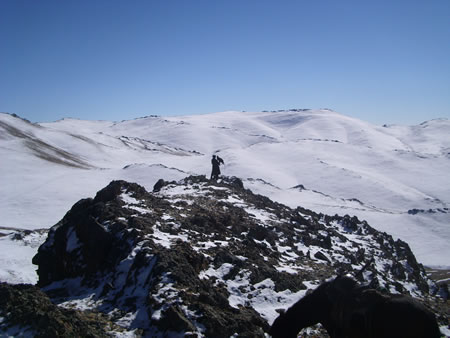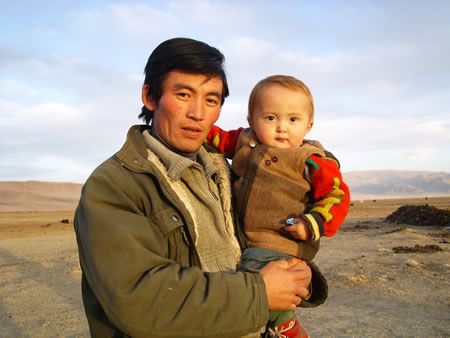The Kazakh Eagle Hunters of Mongolia
Article and photos by John Glinsman

|
|
A Kazakh Eagle Hunter in Mongolia.
|
It is mid-afternoon in the western Mongolian countryside. Simon and I ride horses alongside Donde and his eldest son, Edk. Donde's presence invokes respect. He is a stout man with a bear-like body. I speculate about the large scar that runs the length of his cheek. Did he rescue one of his sheep from a wolf's mouth, wrestling the wolf with his bare hands? As we later learned, the scar came from his eagle when it swooped down onto his gloved hand, open talons accidentally coming into contact with his face. Donde is part of a tradition that stretches across millennia in this part of the world. This tradition could easily die in the next couple of generations if not for those like Donde's sons, who carry on the tradition of eagle hunting: a highly adapted form of hunting using eagles to kill prey. In the past, eagle hunters used eagle hunting as one of the many survival techniques in this cold land of scarce resources. Yet, nowadays, eagle hunting remains mainly a sport.
I feel invigorated as I ride my horse across the barren, moon-like landscape of Bayan-Olgii, the far western region of Mongolia. Kazakhs dominate the region, having fled the communist invasion of their country to find solace here. Similar to the other ethnic groups who inhabit Mongolia, many of the Kazakhs carry on a traditional way of life, raising flocks and living in special tents called gers that can be broken down and transported to a new location every season.
As I ride my horse, I think how great it would be if Western society got rid of automobiles and relied, instead, upon horseback (the saddle sore bum that I develop begs to differ). In Mongolia, they learn how to ride a horse almost as soon as they learn to walk. I am 26 and don't know how to ride a horse. It feels awkward at first as if I am going to fall off. I need to learn how to ride. I am bouncing all over the place. This certainly isn't as comfortable as riding in a car. But it is beautiful out here. The sky is clear, and the weather is calm. Donde and Edk are Kazakh men used to being outside in silence most of the day. As we ride, I look around at the beauty of the landscape. These men don't need to think about stopping to enjoy the view because they spend most of their lives outside like this.
After the initial awkwardness of a new experience, Simon and I get a little more comfortable riding our horses. Remembering a few tricks from old western movies, I yell: "Yah!" and kick my horse with both feet. The horse, in response, picks up the pace. Donde yells: "Jacer," which means, "Well done." We ascend the north side of the mountains adjacent to Donde's ger. A light covering of snow adds a layer of white to the already remarkably pure landscape. I gaze upon the stark beauty of my surroundings. The inspiration of the land fills my imagination with thoughts of moving to Mongolia and living a nomadic lifestyle. I want to buy a ger and care for flocks on my horse in this wild, unregulated land.

|
|
A Kazakh Eagle Hunter standing on a hilltop.
|
Unlike a typical day outdoors in the Western world, we brought nothing. No first aid kit, no daypack, no food or water. I did not sign a release waiver to come out here. Those who live in the Western world cannot understand this attitude. It would be labeled as unsafe. I stuff my gloves and camera into the front of my red del, which is a pouch. It reminds me of the Legend of Zelda as if I have a pouch full of magic objects. The del is the traditional Mongolian garb for keeping warm. I purchased it in Ulaanbataar, the capital of Mongolia, to ward off the cold of western Mongolia, about which many a soul forewarned me. However, the beginning of October does not feel that cold to me. Later on, it will get cold in December and January, occasionally reaching temperatures as low as –40 F. But today, the temperature is comfortable enough to be outside. Wearing my red del, I feel like I am on a quest. When I was young, I went on many imaginary quests. Today's journey fulfills these boyhood adventures. I am riding on a horse in a foreign land, dressed in a magic garment, and a man is riding with an eagle perched on his forearm in front of me — all the elements of an adventure. What will become of our present quest?
We have now been riding for an hour. Edk heads off to a particular spot while Donde ascends higher with the eagle. Edk tosses stones and makes noises to scare animals out from under the rocky slopes. Meanwhile, Donde has removed the mask from the eagle's head. During training, the eagle hunters place a mask on their eagle and tie a large stone to its talons. Every time the eagle tries to fly with the mask on, it cannot because it is tied to a stone. Eventually, the eagle is conditioned to believe that when it has the mask on, it cannot fly. The eagle learns to trust its master and will fly back to its master when the mask is removed. Laser-sharp eyes search for prey when the mask is removed.
Donde has passed on the tradition of eagle hunting to Edk, his oldest son. Although dressed in a leather coat with a cigarette in his mouth, Edk differs in many respects from the characteristics of Western men. He acts with definiteness and without hesitation. He does not smile that often, and he is not soft. There is a gap of "otherness" that separates me from him. Simon and I follow Edk as he moves from spot to spot without saying anything. Words are not needed to follow a Kazakh man on a horse. Spotting some tracks, Edk leads us in their direction. They are the tracks of the tulka, the red-tailed fox, the prized prey for the eagle hunters. If we successfully kill a tulka, the eagle hunters will eat its meat and use its red coat to make decorative ornaments and their traditional fur hat. Once again, Edk overturns stones and makes noises, but to no success. Riding down to meet us, Donde says "jok" which, in reality, means "no," but I think he is saying the Kazakh word for some animal, so I say jok back as if I know what I am talking about.
We descend down to the valley below us and ascend the opposite ridge. This time, we go with Donde to the top, while Edk stays below. Navigating through vertical shale beds, we admire the views of the alluvial fins stretching down to the valley below us. Each time we come to a crest, Donde stops and removes the mask from his eagle to scope out prey. Dismounted, we take photos of his silhouetted figure as he stands with his back to us, his arm outstretched with the eagle. We continue from one crest to the next without success. Even though no animals are around, Donde releases his bird into the air. The eagle soars into the valley below. Will the eagle come back? What is going to happen? I gazed in wonder, marveling that a flying creature and a human could develop a trusting relationship. If this bird wanted to, it could take off for good, soaring away into western Mongolia's vast blue open expanse. It doesn't fly away, nor does it come back. Instead, the bird lands on the top of a butte in the valley below, non-responsive to Donde's summoning yelps. Finally, Donde and Edk descend the valley to retrieve the eagle. Once closer to the bird, they eventually get it to fly down from the butte, and Donde rides his horse to retrieve it. I guess that eagle hunting is not constantly fine-tuned. My horseback riding could be better tuned, too. Now far behind, Simon and I need help getting our horses to descend the steep slope to meet our eagle-hunting companions. I cannot understand why the horses of Donde and Edk ride down the same slope quickly while I kick, yell at, and command my seemingly stubborn horse to no avail. Rather than descending directly down, my horse moves from side to side, occasionally achieving downward progress. I feel like an ignorant tourist.
Before we were halfway down the slope, Donde and Edk met us, and the four of us ascended back to the top of the ridge. Arriving at the top, our horses still move awkwardly and slowly. Edk pauses to adjust a strap on my saddle when suddenly, another Kazakh man emerges over the ridge, yelling words in Kazakh that I do not understand. Seated on a horse with another horse tied behind, he has a rifle strapped over his shoulder. Whatever he yells generates a lot of excitement, and the next thing I know, we are galloping off quickly to the other side of the ridge. Across from me, I see Donde, the eagle perched on his arm without its mask, laser-sharp eyes zeroing in on something below. In a split second, I see the eagle in the air and a giant creature running out from the rocks down the slope of the ridge.
The dog-like creature is too big to be a fox. It is a wolf! I can't believe my eyes! Before coming here to meet the eagle hunters, I inquired about the types of animals that the eagles hunt. They listed various small creatures, such as foxes and rabbits, and then said: "Wolves." I couldn't imagine how an eagle could take down a beast as giant as a wolf. Painted on a wall in
Bayan-Olgii
, I saw a dramatic scene of a wolf lying on its back, teeth snarled in surprise, as an eagle swoops from above, razor-sharp talons aimed at its head. Now, I am watching this very scene unfold before my eyes!
The eagle soars downward, making a series of concentric circles around the wolf, circling slightly lower each time. My body is filled with anticipation, as if I am on the bench watching my fellow hockey mates during the third period of a tied game. It is uncertain what will happen. Will the eagle eventually swoop down on the wolf, or will it keep flying? Will the wolf escape becoming prey? The wolf is now at the bottom, running across rocky ground, the eagle getting closer and closer as it makes its circles. It happens! The eagle swoops down on the wolf, knocking the wolf to the ground. I yell louder than the screams of fans who cheer a player's score. The next thing I knew, the wolf was back on its feet, running away, with the eagle flying low to the ground in pursuit of it. The two disappear behind some rocks. We do not know what has happened to either of them. Edk goes galloping off after them. I look over at Donde. He doesn't seem excited. I wonder what is going on in his head.
Donde leaves Simon and me with this mystery hunter who suddenly emerges from nowhere. We start to descend to the bottom. We are going so slowly that the mystery hunter makes us get off our horses and leads them down by rope. He makes a notion to me, sticking out his tongue, rolling his eyes, and slicing his neck with his finger, which could mean that the eagle killed the wolf, or the wolf killed the eagle — or I want to kill you! I am mindful of the rifle he has on his shoulder. Near the bottom, we come upon Donde and Edk. They have no wolf or eagle. Edk rides in one direction, while Donde rides in another, calling for his eagle to return. No eagle comes back in response. Donde looks concerned. We are waiting for Edk. After quite a while, Edk returns with the eagle on his arm. Donde examines his eagle. As far as I can tell, the eagle is okay. Donde looks over at Simon and me, shaking his head and making a chattering noise with his lips. I'm not sure what he means by this.
We begin the journey home with the eagle safe on Donde's arm. Having a good part of the day behind me, I feel more confident in my horse-riding skills. I want to go fast. I whack my horse on its hind using the whip they gave me earlier in the day. The horse takes off, galloping at a very high speed to me. I am doing all I can to stay on the horse as my body bounces everywhere. I don't know how to stop the horse as I struggle to stay on. I know it is only a matter of time before I am thrown off, so I roll off the side, making sure to get my feet out of the stirrups so I don't get caught and dragged on the ground. My red del keeps me from getting scraped up. After I fall off, my horse stops. I brush the dirt off me and show my horse some love. It's not his fault. Donde and Edk smile at me and laugh. Every time I get ahead, they yell: "John, John." I feel controlled. I was starting to get the knack of this horse-riding thing.
Hot yak milk tea and a warm meal await us back at the ger. Baxa, our translator, and the other woman have prepared potatoes, mutton, and rice for us. Simon and I refresh our bodies with food. I do not realize what an unusual meal this is. In the next three weeks, most of my meals will consist of a disappointing and unsatisfying fried flower ball called baursac. During our meal, our translator explained what happened during the encounter with the wolf. Donde inadvertently released the ropes with which he held the eagle in his gloved hand. Because of its training, the inexperienced 2-year-old eagle flew after the wolf. Typically, the eagle hunters would not release a sole eagle to take on a dangerous animal like a wolf — perhaps two or three eagles. It would have been celebrated if Donde's eagle had killed the wolf. Maybe they would have written songs about it.
During the attack, the wolf bit the eagle's talon. Edk lathers the eagle's injured talon in a bowl, disinfecting the wound with medicine. Donde pets his eagle affectionately, pressing his cheek against the eagle's face. That day, as he watched his bird soar, Donde wondered if he would ever see it alive again. He would cry if he lost his eagle.
After the meal, Simon, Baxa, and I walk by the river. Simon and I skip stones. I remember Baxa's words the previous day as I listened to the gentle calm of the current: "To listen to the voice of the river is good for the mind." As dark approaches, we go back inside the ger. Inside the ger, we sit in a circle with other men from the community and eat another meal (two good meals in one day would be something I would value later on during my time with the eagle hunters). After dinner, Simon and I take shots of vodka with the older men. Donde's sons, although older than us, do not drink. Baxa explains that they are afraid to drink in front of their father. Using Baxa to translate for us, we make toasts. I wish the eagle future success, and I also hope that I will not fall off my horse again. My second wish must have been too much to ask because two days later, my horse tripped over a rock, sending me to the ground. Simon wishes that Donde's eagle becomes the best eagle ever. After the other men leave, Donde asks some questions about us. We sit on each side of him. He puts his hand upon each of us, showing acceptance. It is a remarkable end to the day to have acceptance from this man of men, this warrior eagle hunter, husband, father, and master herdsman.
It is rare to witness an eagle kill a fox or tulka. After ten days of hunting, one might not see any action. To see an eagle go for a wolf is even more rare. To have witnessed this on the first day is almost miraculous. It has been a special day indeed.

|
|
Father with son. |
John Glinsman visited the Eagle Hunters while journeying overland from Norway to Vietnam.
|
